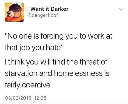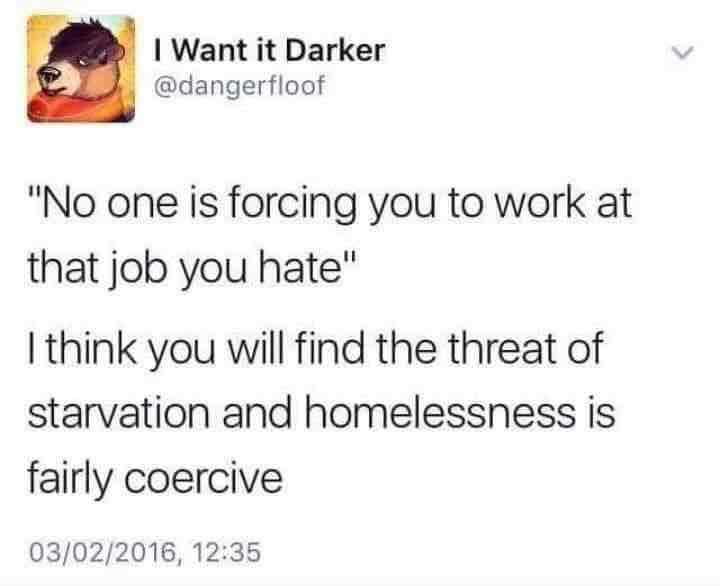No one is forcing you to work
No one is forcing you to work


No one is forcing you to work


You're viewing a single thread.
So make a self sustaining commune that lives up to your principles. I think you will find that to be more work than your average 9-5 however.
It's illegal to homestead in the United States without first buying the land from whoever owns it already, even if the land is entirely unused. This means you need a massive injection of capital, the kind of capital that would mean you're in the top 10% of Americans (at least) in terms of wealth, exactly the kinds of people who aren't looking to escape society. This isn't even mentioning the kinds of building permits and other stamps of approval from the government you'd need to do this, also requiring capital and often licensing by a trained professional.
Of course you can just find unused land and roll the dice on getting caught. A lot of communes have done this successfully, but not everyone is comfortable doing something that is technically illegal.
A lot of people in the top 10% are still working class, and would benefit from a dismantling of capitalism, but they're not so poor that leaving society is favorable, just reforming society.
For the people who would benefit from leaving society, they're coerced to stay via laws written by and for the powerful (enforcing private property rights for example, denying access to unused lands).
These are fair counterpoints, thanks for the reply. My point was more that work is necessary in any society given today’s technology, even in one designed to be as egalitarian and non-coercive as possible
You don't need a lot of personal capital if you fundraise prior to starting your commune, and have everyone pitch in the equity from sold homes/cashed out 401(k)s etc
Also you don't have a right to someone's property simply because they aren't using it at the moment
A lot of Americans have negative net worth, so everyone cashing out would likely mean you're still in debt, which is one of the ways our society keeps people trapped.
There's a difference between legal rights and moral rights. Legally you're correct, but 150 years ago people legally had the right to buy slaves, but they didn't have the moral right to.
Similarly, people have the legal right to buy hundreds of acres of land and hold onto it until it increases in value, and then sell it later. This is immoral though, it's scalping. We all understand scalping is bad when it's through the lens of GPUs or consoles because we weren't raised hearing about how "smart investors" invested in GPUs, we just heard about "investing" in housing or land.
If you have a solid argument why scalping houses or land should be permissible and even praised, while scalping GPUs/consoles should be impressible or at least scolded, I'd love to hear why.
I'd assert that scalping necessities is actually worse than scalping luxury goods.
I think it's unhelpful to frame structural economic problems as moral wrongs done by individuals, because these are all situations where more people accepting a moral consensus doesn't actually resolve the problem. If there are 50 active GPU scalpers in the market, and a shaming campaign succeeds in reducing that number to 10, ultimately those 10 people are still going to be able to exploit the differential in retail price and actual market price to the same extent. Maybe it would take them a little while to scale up their operations, but they would do it. No amount of moralizing against scalpers can overcome supply and demand in this situation or actually make cheap graphics cards available to everyone.
Squatting isn't immoral IMO, but enshrining legal protections for squatters would probably just result in a lot of effort being wasted on preventing trespassing lest property rights be forfeit. Instead it would be better to have high taxes on unused land and various forms of redistribution to keep everyone in a situation where they have genuine choice in their lives. The point shouldn't be deciding who the wrongdoers are and punishing them.
Whether or not it's helpful is orthogonal to whether it's true, which is more what I'm concerned with. Maybe there's a point to be had about effectively trying to convince people, but I don't have an obligation to be the most effective conversationalist or converter.
However I'd happily support systemic approaches to reducing the effectiveness of housing scalpers. Calling them immoral is not mutually exclusive with supporting legislation against them. I'd even say those things are usually aligned.
legislation against them
This is why I don't think it is aligned. There is a lot of possible legislation that would effectively punish "scalpers" or reduce their effectiveness in pursuing their goals, but would not actually help resolve the actual underlying problem or even make things worse. For instance trying to ban the practice directly, or trying to fix prices, those generally will backfire. If the focus is legislating "against" them, that's looking it as a justice problem instead of an incentives problem, but even if it is immoral punishing immoral acts is much less important than solving the problems in peoples lives, and these goals can easily be at odds.
It's not scalping to hold onto something for years. That's the opposite of scalping, which is taking advantage of surges in demand for quick profit.
Owning land is not a necessity.
GPU scalping isn't technically scalping either by some definitions, but the layman usage of the word is "buying up a product and selling it back at an inflated price". Someone is still a GPU scalper even if it takes them 2 years to resell some stock.
By this definition, housing scalpers are scalpers too. I'm not in the business of prescribing how people should speak, so if you have some academic issue with the word "scalping" I can choose a different one. We'll call it "yeegstrafing", but my contention is still the same despite what you call it.
People correctly have an issue with GPU yeegstrafers, because they're not providing any value, they're just hoarding excess goods and reselling to make a profit. Housing/land yeegstrafers are doing the same thing with necessities.
You may claim that housing or land more generally (you need land for housing/shelter) is not a necessity, but larger society disagrees. People generally regard shelter+food+water as the basic necessities. If someone successfully hoarded all the land, nobody would have access to shelter.
The correct term for buying a thing at a lower value than you sell it for after a period of time is "investing"
What you need isn't stealing from people, it's changing zoning laws.
You can call it scalping, yeegstrafing, investing, whatever. I recognize that depending on what you call it, people will have different emotional responses to it. If you call it scalping, it'll be negative. Investing it'll be positive. Yeegstrafing, probably just confusion.
But playing with words isn't the game I'm trying to play, I have a contention with the action, not the word choice. People shouldn't be allowed to invest in certain things, you can agree. Like you shouldn't be able to buy up humans at a low value and sell them at a higher value later. Even if you called it investing, it'd still be impermissible.
Similarly, restricting access to land/shelter, driving up prices by reducing supply, and then later selling your hoarded supply at an excess due to said price driving is problematic. It's restricting cheap access to housing so some people can "make" money.
Using "scalping" as the word to describe this highlights its parasitic nature, they're siphoning value out of the economy and restricting access to shelter/land while doing it.
Using "investing" instead ignores the negative societal ramifications, and only focuses on the positive personal outcomes (generating money for yourself).
You keep assuming that things you say are true but without any reasoning whatsoever behind those things. It is not "problematic" to own land.
If anything, what's problematic is legislating that people can't build on land they own
The reasoning (as I've clearly outlined several times) is that restricting access to land/shelter in the name of extracting money from the working class is a bad societal outcome. I would imagine you agree with that, but if you don't we're having the wrong conversation.
Your proposal is that the idea of rent, itself, is a negative?
Yeah that's an insane take.
No, that's gouging. Scalping, at least as I've always understood it, is buying up a limited resource and then selling it at an inflated price.
I'm not taking a position on the morality of buying unused land, just trying to get the terms right.
The moral rights are more complicated when the property is in something that includes natural resources such as land. Land isn't the fruits of anyone's labor, so everyone has an equal claim to it. There are a variety of ways this equal claim could be recognized, but one that has been proposed is requiring active occupancy and use to retain ownership of land. Another is a 100% land value tax whose revenue is distributed as a social dividend to citizens, which would give people some capital
I always have an ear open for Georgism.
Getting others as interested as I am is the challenge
To get other's interest,
Very much a ‘you dislike society yet you participate in it. Curious!’ sort of a response. Additionally, OP problem was that they hated their work, not that there was too much of it. But I’d expect as much from my mortal foe.
Yes, I participate in a society I don't necessarily like. Either I participate, or starve to death...
You act like it's a choice.
Having to work isn’t a societal issue, it’s the physical reality. Without food, water, and shelter, you’ll die, and someone needs to work to provide those things.
I want a post-scarcity utopia as much as the next guy, but until then, work needs to be done.